Aditya Rastogi
From Restless to Contextual: A Thresholding Bandit Approach to Improve Finite-horizon Performance
Feb 07, 2025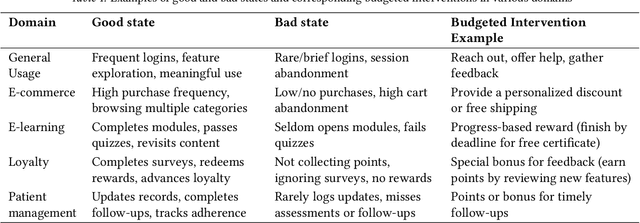
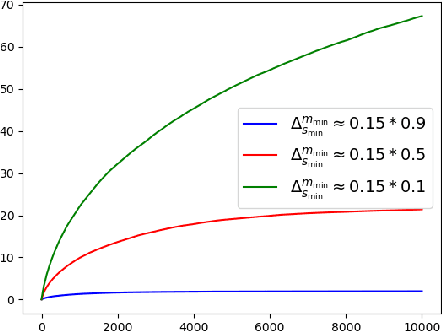
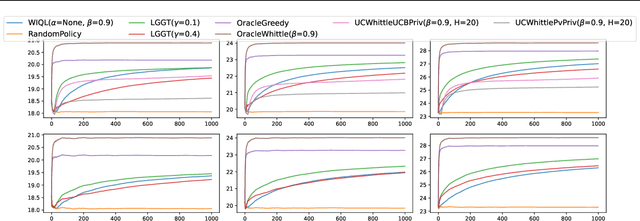
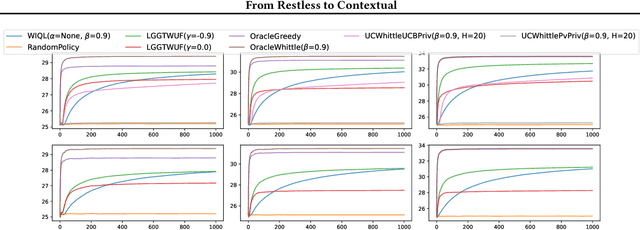
Abstract:Online restless bandits extend classic contextual bandits by incorporating state transitions and budget constraints, representing each agent as a Markov Decision Process (MDP). This framework is crucial for finite-horizon strategic resource allocation, optimizing limited costly interventions for long-term benefits. However, learning the underlying MDP for each agent poses a major challenge in finite-horizon settings. To facilitate learning, we reformulate the problem as a scalable budgeted thresholding contextual bandit problem, carefully integrating the state transitions into the reward design and focusing on identifying agents with action benefits exceeding a threshold. We establish the optimality of an oracle greedy solution in a simple two-state setting, and propose an algorithm that achieves minimax optimal constant regret in the online multi-state setting with heterogeneous agents and knowledge of outcomes under no intervention. We numerically show that our algorithm outperforms existing online restless bandit methods, offering significant improvements in finite-horizon performance.
Efficient MedSAMs: Segment Anything in Medical Images on Laptop
Dec 20, 2024


Abstract:Promptable segmentation foundation models have emerged as a transformative approach to addressing the diverse needs in medical images, but most existing models require expensive computing, posing a big barrier to their adoption in clinical practice. In this work, we organized the first international competition dedicated to promptable medical image segmentation, featuring a large-scale dataset spanning nine common imaging modalities from over 20 different institutions. The top teams developed lightweight segmentation foundation models and implemented an efficient inference pipeline that substantially reduced computational requirements while maintaining state-of-the-art segmentation accuracy. Moreover, the post-challenge phase advanced the algorithms through the design of performance booster and reproducibility tasks, resulting in improved algorithms and validated reproducibility of the winning solution. Furthermore, the best-performing algorithms have been incorporated into the open-source software with a user-friendly interface to facilitate clinical adoption. The data and code are publicly available to foster the further development of medical image segmentation foundation models and pave the way for impactful real-world applications.
Interplay between Federated Learning and Explainable Artificial Intelligence: a Scoping Review
Nov 07, 2024



Abstract:The joint implementation of Federated learning (FL) and Explainable artificial intelligence (XAI) will allow training models from distributed data and explaining their inner workings while preserving important aspects of privacy. Towards establishing the benefits and tensions associated with their interplay, this scoping review maps those publications that jointly deal with FL and XAI, focusing on publications where an interplay between FL and model interpretability or post-hoc explanations was found. In total, 37 studies met our criteria, with more papers focusing on explanation methods (mainly feature relevance) than on interpretability (mainly algorithmic transparency). Most works used simulated horizontal FL setups involving 10 or fewer data centers. Only one study explicitly and quantitatively analyzed the influence of FL on model explanations, revealing a significant research gap. Aggregation of interpretability metrics across FL nodes created generalized global insights at the expense of node-specific patterns being diluted. 8 papers addressed the benefits of incorporating explanation methods as a component of the FL algorithm. Studies using established FL libraries or following reporting guidelines are a minority. More quantitative research and structured, transparent practices are needed to fully understand their mutual impact and under which conditions it happens.
The Digital Transformation in Health: How AI Can Improve the Performance of Health Systems
Sep 24, 2024Abstract:Mobile health has the potential to revolutionize health care delivery and patient engagement. In this work, we discuss how integrating Artificial Intelligence into digital health applications-focused on supply chain, patient management, and capacity building, among other use cases-can improve the health system and public health performance. We present an Artificial Intelligence and Reinforcement Learning platform that allows the delivery of adaptive interventions whose impact can be optimized through experimentation and real-time monitoring. The system can integrate multiple data sources and digital health applications. The flexibility of this platform to connect to various mobile health applications and digital devices and send personalized recommendations based on past data and predictions can significantly improve the impact of digital tools on health system outcomes. The potential for resource-poor settings, where the impact of this approach on health outcomes could be more decisive, is discussed specifically. This framework is, however, similarly applicable to improving efficiency in health systems where scarcity is not an issue.
Adaptive User Journeys in Pharma E-Commerce with Reinforcement Learning: Insights from SwipeRx
Aug 15, 2024



Abstract:This paper introduces a reinforcement learning (RL) platform that enhances end-to-end user journeys in healthcare digital tools through personalization. We explore a case study with SwipeRx, the most popular all-in-one app for pharmacists in Southeast Asia, demonstrating how the platform can be used to personalize and adapt user experiences. Our RL framework is tested through a series of experiments with product recommendations tailored to each pharmacy based on real-time information on their purchasing history and in-app engagement, showing a significant increase in basket size. By integrating adaptive interventions into existing mobile health solutions and enriching user journeys, our platform offers a scalable solution to improve pharmaceutical supply chain management, health worker capacity building, and clinical decision and patient care, ultimately contributing to better healthcare outcomes.
Optimizing HIV Patient Engagement with Reinforcement Learning in Resource-Limited Settings
Aug 14, 2024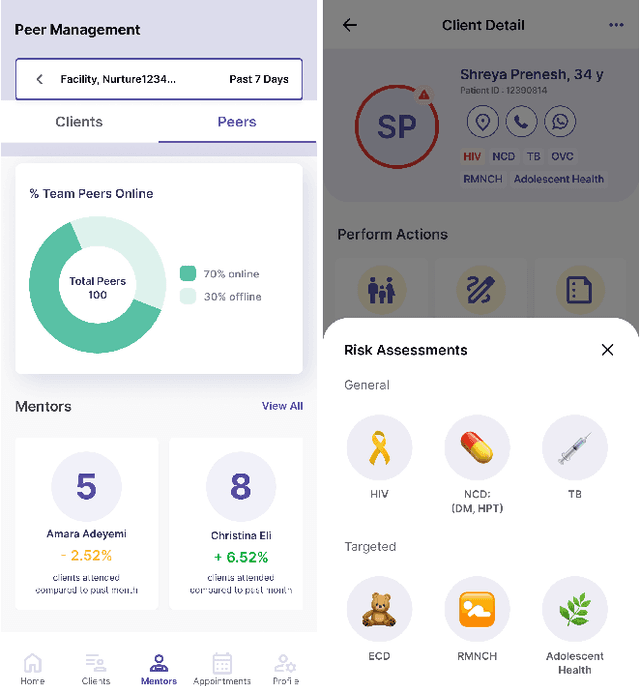
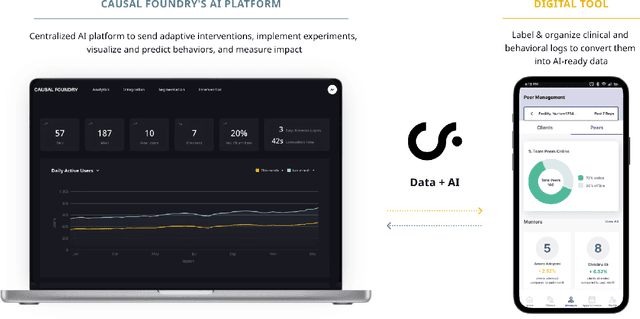
Abstract:By providing evidence-based clinical decision support, digital tools and electronic health records can revolutionize patient management, especially in resource-poor settings where fewer health workers are available and often need more training. When these tools are integrated with AI, they can offer personalized support and adaptive interventions, effectively connecting community health workers (CHWs) and healthcare facilities. The CHARM (Community Health Access & Resource Management) app is an AI-native mobile app for CHWs. Developed through a joint partnership of Causal Foundry (CF) and mothers2mothers (m2m), CHARM empowers CHWs, mainly local women, by streamlining case management, enhancing learning, and improving communication. This paper details CHARM's development, integration, and upcoming reinforcement learning-based adaptive interventions, all aimed at enhancing health worker engagement, efficiency, and patient outcomes, thereby enhancing CHWs' capabilities and community health.
Adaptive Behavioral AI: Reinforcement Learning to Enhance Pharmacy Services
Aug 14, 2024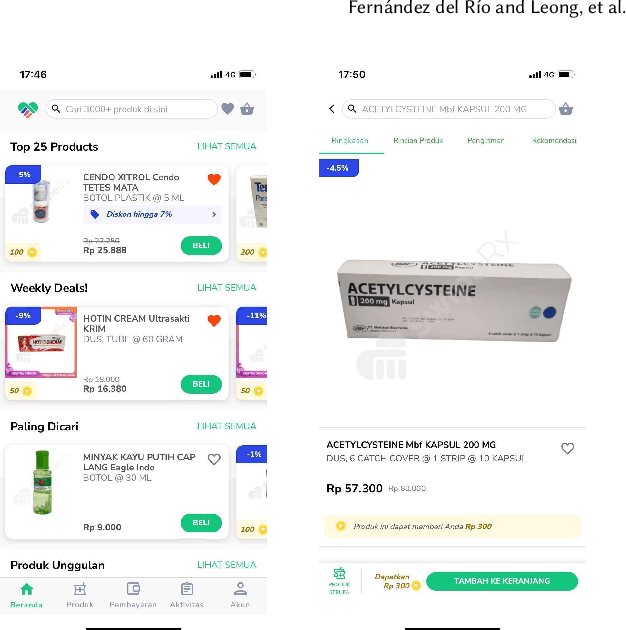
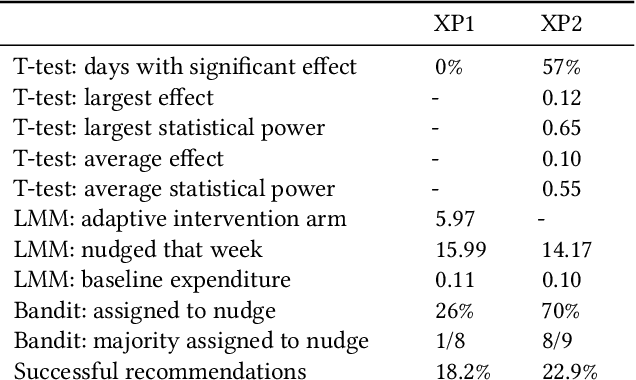
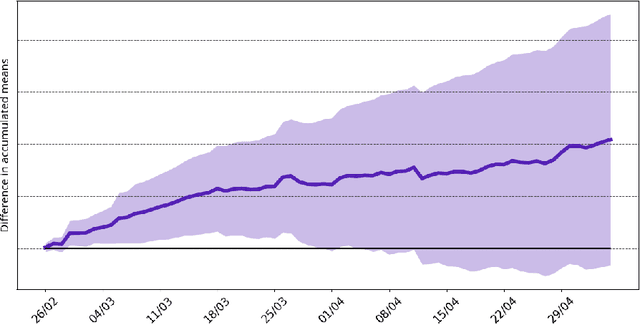
Abstract:Pharmacies are critical in healthcare systems, particularly in low- and middle-income countries. Procuring pharmacists with the right behavioral interventions or nudges can enhance their skills, public health awareness, and pharmacy inventory management, ensuring access to essential medicines that ultimately benefit their patients. We introduce a reinforcement learning operational system to deliver personalized behavioral interventions through mobile health applications. We illustrate its potential by discussing a series of initial experiments run with SwipeRx, an all-in-one app for pharmacists, including B2B e-commerce, in Indonesia. The proposed method has broader applications extending beyond pharmacy operations to optimize healthcare delivery.
The 2024 Brain Tumor Segmentation (BraTS) Challenge: Glioma Segmentation on Post-treatment MRI
May 28, 2024
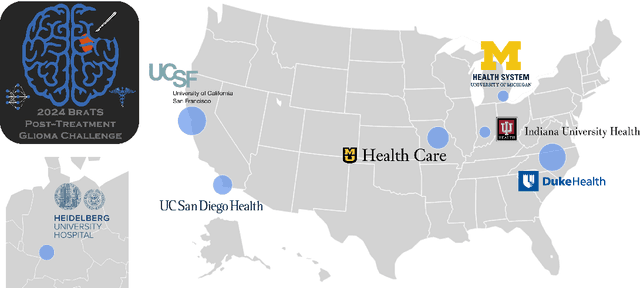
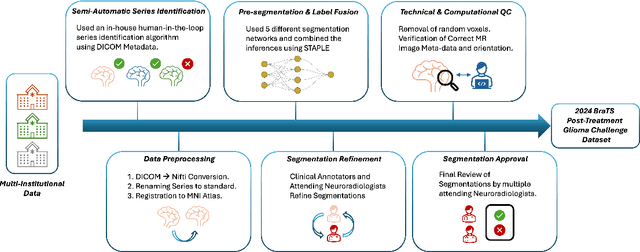
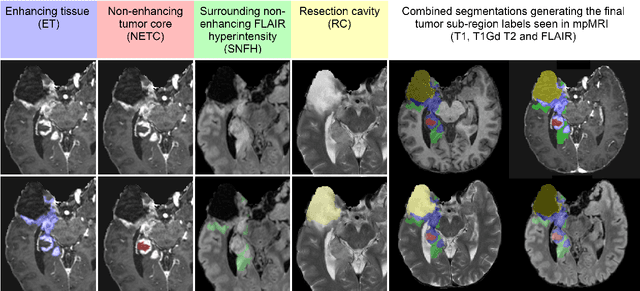
Abstract:Gliomas are the most common malignant primary brain tumors in adults and one of the deadliest types of cancer. There are many challenges in treatment and monitoring due to the genetic diversity and high intrinsic heterogeneity in appearance, shape, histology, and treatment response. Treatments include surgery, radiation, and systemic therapies, with magnetic resonance imaging (MRI) playing a key role in treatment planning and post-treatment longitudinal assessment. The 2024 Brain Tumor Segmentation (BraTS) challenge on post-treatment glioma MRI will provide a community standard and benchmark for state-of-the-art automated segmentation models based on the largest expert-annotated post-treatment glioma MRI dataset. Challenge competitors will develop automated segmentation models to predict four distinct tumor sub-regions consisting of enhancing tissue (ET), surrounding non-enhancing T2/fluid-attenuated inversion recovery (FLAIR) hyperintensity (SNFH), non-enhancing tumor core (NETC), and resection cavity (RC). Models will be evaluated on separate validation and test datasets using standardized performance metrics utilized across the BraTS 2024 cluster of challenges, including lesion-wise Dice Similarity Coefficient and Hausdorff Distance. Models developed during this challenge will advance the field of automated MRI segmentation and contribute to their integration into clinical practice, ultimately enhancing patient care.
Synthetic Data Generator for Adaptive Interventions in Global Health
Mar 06, 2023Abstract:Artificial Intelligence and digital health have the potential to transform global health. However, having access to representative data to test and validate algorithms in realistic production environments is essential. We introduce HealthSyn, an open-source synthetic data generator of user behavior for testing reinforcement learning algorithms in the context of mobile health interventions. The generator utilizes Markov processes to generate diverse user actions, with individual user behavioral patterns that can change in reaction to personalized interventions (i.e., reminders, recommendations, and incentives). These actions are translated into actual logs using an ML-purposed data schema specific to the mobile health application functionality included with HealthKit, and open-source SDK. The logs can be fed to pipelines to obtain user metrics. The generated data, which is based on real-world behaviors and simulation techniques, can be used to develop, test, and evaluate, both ML algorithms in research and end-to-end operational RL-based intervention delivery frameworks.
 Add to Chrome
Add to Chrome Add to Firefox
Add to Firefox Add to Edge
Add to Edge